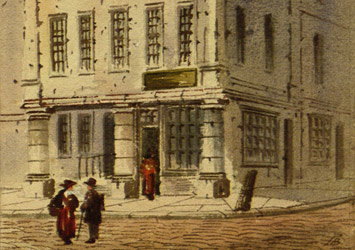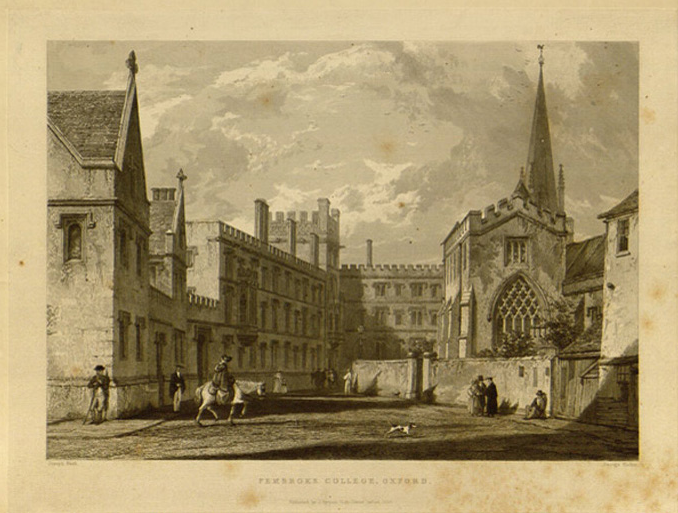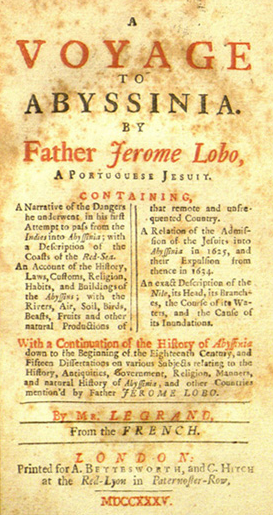Before delivering a brief summary of Johnson’s life, it is worth mentioning that Johnson held a very particular opinion of biography. He maintained that it ought to “pass slightly over those performances and incidents which produce vulgar greatness, to lead the thoughts into domestic privacies, and display the minute details of daily life.” (Hitchings, 2005, p. 9). During the later years of his adulthood, however, when Johnson was definitively the most prominent and celebrated literary figure in England, it’s nearly impossible to chronicle an incident in his life that didn’t implicate his “vulgar greatness.” I will therefore begin with his modest upbringing in Lichfield.
 Johnson's childhood home with the family bookstore at street-level. Watercolor on paper, artist unknown. (Image Source 2)
Johnson's childhood home with the family bookstore at street-level. Watercolor on paper, artist unknown. (Image Source 2)
Johnson was born on September 18th, 1709. His father was a local bookseller and sheriff who provided comfortably, but by no means lavishly, for his wife and two sons. Johnson suffered with illness throughout his childhood. Under the care of a wet nurse whose breast milk was infected with tuberculosis, Johnson contracted a painful glandular disease known as scrofula that left him blind in one eye and partially deaf. Throughout his life he would harbor resentment; in his dictionary entry for “nurse,” Johnson quoted Sir Walter Raleigh in describing the “unnatural curiosity {that} has taught all women, but the beggar, to find out nurses, which necessity only ought to commend.” (Hitchings, 2005, p. 12). Around the age of eight, Johnson began to manifest symptoms of a nervous disorder similar to Tourette’s. Though he was almost entirely healthy when he entered his late teens, he would carry the physical scars of his disease for life.
He took refuge from a difficult childhood in his father’s bookstore. His mother taught him to read at a the age three and was fond of showing off her precocious son’s talent for memorizing and reciting chapters from The Book of Common Prayer. Three years later, Johnson began studying at the Lichfield Grammar School, where he learned Greek and Latin. Although he excelled in his formal studies, he took no relish in them. He recalls his teachers as strict and violent. In his Dictionary, he defined “school” as a “house of discipline and instruction.” (Hitchings, 2005, p. 16). It is interesting to note the order in which he chose to offer these designations.
At seventeen, Johnson was liberated from the oppressive Lichfield and invited to spend nine months with his cousin Cornelius Ford. Ford was fourteen years Johnson’s senior and a well-learned scholar, having served a fellowship at Cambridge. Unsurprisingly, Johnson found his academic pursuits far more engaging under the tutorage of his worldly cousin. During his time with Ford, he was exposed to the poets Samuel Garth and Matthew Prior and the playwright William Congreve. These writers would prove deeply influential to Johnson and can be found quoted frequently in his Dictionary.
Two years later, Johnson embarked on another transformative journey. A distant relative’s inheritance and the generosity of one of Johnson’s grammar school friends made it possible for him to attend Pembroke College, Oxford. Though his funding ran dry after only thirteen months, he made thoughtful use of his time. “I bid farewell to Sloth,” he pledged, “being resolved henceforth not to listen to her siren strains.” (Hitchings, 2005, p. 23). Oxford awarded him an honorary degree in the same year he published his Dictionary.
 Pembroke College, Oxford. 1838 Engraving. (Image Source 3)
Pembroke College, Oxford. 1838 Engraving. (Image Source 3)
Johnson returned home from Oxford and sought employment as a teacher. He found the work tedious but fulfilling, and he was able to supplement his monotonous routine with scholarly projects. His first published book was a translation of the Portuguese missionary Jéronimo Lobo’s Voyage to Abyssinia. It drew a nominal profit and lackluster critical recognition. Still, this first venture showcased the skills that would serve him best when he began to compile his Dictionary; his true talent was not for generating original content, as Henry Hitchings observes in his Defining the World, but “for capitalizing on other people’s work – for editing and abridging, for improving and explaining, for paraphrase and critique.” (Hitchings, 2005, p. 28)
In 1735, the same year his translation was published, Johnson was married to Elizabeth Porter, a wealthy widow 45 years of age (to Johnson’s 25). Despite Porter’s family’s adamant disapproval, the couple settled down together in Edial, only three miles away from Johnson’s native Lichfield. Married life provided Johnson with his first taste of financial liberation. With his wife’s money, he set up a school in Edial, which failed dismally within the small space of a year. A tactful administrator though he was not, he managed to produce a historical tragedy (Irene, his first major work) while he fumbled with the messy enterprise of establishing the school.
Johnson grew restless and was eager to bring his Irene to the city stage. In 1737, he moved to London and found work at the Gentleman’s Magazine, the first publication of its era to be termed a “magazine.” According to Hitchings, his time there “accustomed him to the vicissitudes and duties of a life of writing, an existence that combined studious drudgery with occasional opportunities for creative flair.” (Hitchings, 2005, p. 44)
During these early years of his writing career, Johnson struck a friendship with a poet named Richard Savage. Savage was an erratic, violent depressive and his hedonistic lifestyle was a source of mysterious curiosity to the impressionable and naïve Johnson. In 1744, a year after Savage died in debtor’s prison, Johnson set about writing the biography of his troubled friend. Although his Life of Mr. Richard Savage contributed to his burgeoning reputation as writer, it did not provide much financial relief. Johnson’s relationship with his wife had been strained by his years in the company of Savage and as she grew ill, he resolved to provide for her. He was in need of steady work and in 1746 a publisher named Robert Dodsley approached him with a proposition: to compile a comprehensive, modern dictionary of the English language.
Navigate: Don't Judge A Book By Its Cover: An Introduction / The Early Life of Samuel Johnson / The Dictionary in a Sociocultural Context / Nine Years in the Making / The Dictionary Hits the Shelves: Critical and Public Reception / Traces of the Author and his Time / Conclusion: The Legacy of a Book / *Bibliography*

